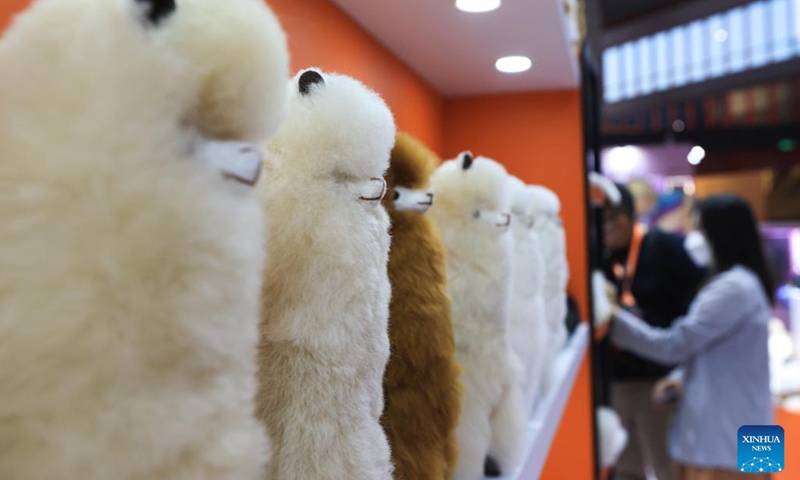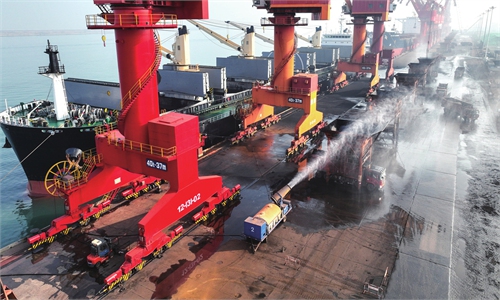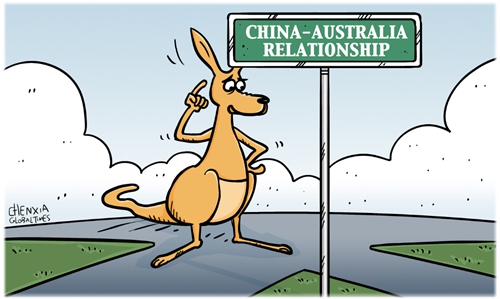Australian enterprises eye business revival in China as bilateral ties see 'warming' trends
Canberra needs to make steady, rational efforts to restore win-win ties: experts

A liquefied natural gas (LNG) carrier from Australia prepares to unload LNG in Qidong, East China's Jiangsu Province, on December 5, 2021. Photo: VCG
After having eagerly awaited the resolution of the trade disputes, Australian businesses, including wine exporters, are now actively strategizing their reconnection with the Chinese market, hoping to swiftly emerge from a pretty long period of sluggish performance.
Experts noted on Tuesday that China-Australia ties are seeing a warming trend. A sound and stable bilateral relationship serves fundamental interests of the two countries and their people, while Canberra needs to maintain a steady and rational approach in order to further restore the mutually beneficial ties with China.
"Treasury Wine Estates Limited (TWE) is well placed to rebuild its business in China," the Australia-based global winemaking and distribution company said in a statement it sent to the Global Times on Monday.
The upbeat statement came after the confirmation by Chinese and Australian governments on Sunday that the two sides had reached consensus on resolving their disputes on wine and wind towers under the WTO framework.
The Australian government said China will undertake a review of its wine tariffs which is expected to take five months, according to the website of Australian Prime Minister Anthony Albanese.
TWE detailed its upcoming efforts to rebuild its business in China in the statement.
According to media reports, TWE used to make one-third of its profits in the Chinese market but has lost most of that business after China implemented a 5-year anti-dumping tariff on imported wines from Australia starting from March 28, 2021.
'Providing hope'
The latest positive development "signifies the potential for smoother trade relations and provides hope for the many businesses that have been impacted," Vaughn Barber, chair of the Beijing-based China-Australia Chamber of Commerce, told the Global Times on Tuesday.
Citing the Australian PM, Barber said this is a very significant decision because the wine industry has indicated they were having difficulty finding other markets to fill the gap that was created by the breakdown in the trade with China.
There are still plenty of business opportunities in the Chinese market. It has been good to see Australian CEOs and university leaders "flock to China" from March. This will continue with the upcoming sixth China International Import Expo (CIIE), Barber noted.

Visitors view alpaca products at a booth of an Australian company at the fifth China International Import Expo (CIIE) in east China's Shanghai, Nov. 7, 2022. Exhibitors from Australia, New Zealand and Peru have displayed alpaca-fur products at the fifth CIIE in Shanghai, attracting many visitors. Photo: Xinhua
During his planned visit to China from November 4 to 7, Albanese will also attend the CIIE in Shanghai at the invitation of Chinese Premier Li Qiang, the Australian PM's office announced on Sunday, noting that "China remains Australia's largest trading partner, amounting to almost a third of [Australia's] total trade."High complementarity
The economies of China and Australia, with a complementarity rate exceeding 80 percent, underscores the mutual benefits of equal cooperation, while "decoupling" would bring great harm to both, Yu Lei, chief research fellow at the Research Center for Pacific Island Countries of Liaocheng University, told the Global Times on Tuesday.
Iron ore is one of the representative industries of mutual economic complementarity between the two countries. China buys more than 80 percent of Australia's iron ore exports, Australian official data showed.
Australian iron ore giant Fortescue Metals Group "has forged strong, long-term relationships with business and government in China, underpinning the success and longevity of this mutually beneficial partnership," a Fortescue spokesperson told the Global Times on Tuesday.
"We remain optimistic on China's crude steel production and demand for the calendar year 2024," the spokesperson said.
China has been the main destination for Australia's exports of minerals, wine, and other agricultural products in recent years. For Australia, in its post-pandemic recovery, the fact is that the immense Chinese market has become even more crucial, Song Wei, a professor at the School of International Relations and Diplomacy at the Beijing Foreign Studies University, told the Global Times on Wednesday.
The hosting of the CIIE in Shanghai is a significant measure for China to share the benefits of its colossal market and promote global development. It reflected China's determination to facilitate the worldwide economic recovery and resurgence, Song noted.
Yet, the sustained thawing of China-Australia relations still faces challenges, and requires Australia to maintain a rational policy toward China, without becoming entangled in the US' anti-China campaign or trapped in a mind-set of political opportunism, Song stressed.
Canberra still maintains discriminatory barriers to Chinese investments and access to certain goods and services markets, Yu pointed out. He noted that the trend of Canberra "politicizing" and "securitizing" mutual economic and trade cooperation between the two countries persists, creating a constant threat to the relations, leading to potential setbacks and downturns in mutual cooperation.
In addition, it takes time to shape a strong economic and trade partnership and it necessitates friendly bilateral relations to cultivate and sustain, experts said.
Echoing the experts' comments, Chen Wei, a Chinese wine importer, told the Global Times on Wednesday that the resolution of the wine disputes is surely a great news. However, many Chinese importers have switched to other suppliers during the past two years and it takes time to rebuild the market for Australian brands.
"The timing to increase the import of Australian wine depends on our current stock," Chen said. "For example, I still have a significant inventory of French and Chilean wine on hand which won't be exhausted until March of next year."
Chen visited wineries in Australia in August. He said many wineries and vineyards were eager to see the trade disputes resolved so they can return to the Chinese market.



